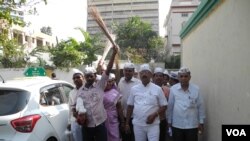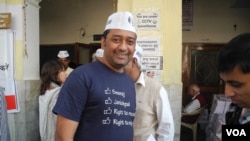NEW DELHI —
As the Indian capital heads to polls next week to choose a local government, all eyes are on a new political party which is mounting a challenge to mainstream parties with its promise to clean up the country’s politics. It was born out of a civil society anti-corruption movement which put graft in the public spotlight.
The house in Central Delhi from where the Aam Aadmi or Common Man’s Party runs its campaign buzzes with activity as scores of volunteers prepare for a last push to gather support ahead of Wednesday’s vote in New Delhi.
They range from young professionals to housewives to students. Two years ago, many of them took part in massive street protests in the Indian capital demanding an end to corruption.
That anti graft movement petered out. When one of its main architects, former civil servant, Arvind Kejriwal, launched a political party last year vowing to clean up public life, they joined his campaign. They knock on doors to woo voters. They prepare posters and campaign material. They help people to enlist as voters.
An I -T (Information Technology) professional, Sandeep Bisht is one such volunteer. He has quit his assignment in London and returned to his home city to help “transform India’s politics.”
“What I want is fair governance, people should have some basic rights, like I have seen abroad, the basic requirements of the citizens are there….you should have full electricity, pure water, your work should be done on time,” said Bisht.
The Aam Aadmi Party’s bid for power in Delhi was initially dismissed as far-fetched in a city where India’s two main parties -- the Congress Party and the Bharatiya Janata Party hold sway and where the Congress has ruled for the last 15 years.
But polls show that the activists turned politicians have made surprising headway. They are tapping into the deep anger at massive corruption scams and the disillusionment among ordinary Indians, many of whom yearn to change the existing political culture.
The Aam Aadmi Party is staying away from the traditional support bases of India’s political parties: community, caste, religion. Their single point agenda is to sweep away corruption. The symbol they have picked: a broom. Their supporters wear white caps with the words ”I am the common man.”
The party’s chief strategist, Yogendra Yadav, says they are striking a chord.
“If we go by two kinds of evidences, one is a series of surveys, and the second is just the feel on the street that you get, something is changing. What we know for sure is that Delhi’s two party politics has ended. It is a triangular contest, that everyone is conceding," Yadav said. "Who is number one is what people are contesting. My own sense is people usually underestimate an up and coming party.”
In a country where political parties have deep pockets, the new party is trying to garner support on a shoe string budget. The modest house from where it runs its campaign has been lent by a businessman. It cannot afford expensive billboards, so it has pasted its posters on the back of auto rickshaws, the mode of transportation popular with the socio economic class it is wooing. It relies on door to door campaigning in poor and middle class homes where people are fed up with the bribes they have to give to get ration cards and licenses and livid at runaway food prices.
Yogendra Yadav feels paucity of resources is not a handicap for a party taking on the entrenched ones for being corrupt.
“Lack of money is precisely our visiting card, it is our calling card. People look at the posters of other parties, find this one poster which is somewhat clumsy, which is not done by a professional, and they connect to it," said Yadav. "They see a political party trying to live within very limited means. This is an experience they have everyday.”
Although the Aam Aadmi Party has established its presence, it still faces huge challenges. The most difficult: to convince skeptics that an untested, year-old party can be politically viable.
Only a handful of its candidates are familiar faces. They have not been able to steer away from populist measures used by mainstream parties to garner votes. Their manifesto promises to slash electricity tariffs by half and provide 700 liters of water free to every family.
Some voters in New Delhi question their ability to deliver on such promises. Others are either confused or unconvinced about disturbing the status quo.
Charu Sahni, a teacher, believes the older the better. "That’s it. Yes, you can give a chance to the new one, but it’s again like taking a chance. Whatever the old people are, they are experienced,” said Sahni.
Andrew Robin Patrick who is a professional said a chance must be given. "Risk factor is there. But we should give a chance, but I don’t know what will happen afterwards,” he said .
Political analyst Satish Misra with the Observer Research Foundation doubts the party will be able to translate the huge hype it has generated into a significant number of seats in the Delhi state Assembly.
“This particular party should be able to make a dent yes, but while the Aam Aadmi Party is able to attract disgruntled elements, they don’t have a base of their own,” said Misra.
The Aam Aadmi Party is unperturbed. It says its dream is to return power to the people, and it can do it either by forming the government or questioning those in power from opposition benches.
Political analysts say that if the party manages to make its presence felt in the capital city, it will bring a whole new dimension into national elections scheduled for next year.
The house in Central Delhi from where the Aam Aadmi or Common Man’s Party runs its campaign buzzes with activity as scores of volunteers prepare for a last push to gather support ahead of Wednesday’s vote in New Delhi.
They range from young professionals to housewives to students. Two years ago, many of them took part in massive street protests in the Indian capital demanding an end to corruption.
That anti graft movement petered out. When one of its main architects, former civil servant, Arvind Kejriwal, launched a political party last year vowing to clean up public life, they joined his campaign. They knock on doors to woo voters. They prepare posters and campaign material. They help people to enlist as voters.
An I -T (Information Technology) professional, Sandeep Bisht is one such volunteer. He has quit his assignment in London and returned to his home city to help “transform India’s politics.”
“What I want is fair governance, people should have some basic rights, like I have seen abroad, the basic requirements of the citizens are there….you should have full electricity, pure water, your work should be done on time,” said Bisht.
The Aam Aadmi Party’s bid for power in Delhi was initially dismissed as far-fetched in a city where India’s two main parties -- the Congress Party and the Bharatiya Janata Party hold sway and where the Congress has ruled for the last 15 years.
But polls show that the activists turned politicians have made surprising headway. They are tapping into the deep anger at massive corruption scams and the disillusionment among ordinary Indians, many of whom yearn to change the existing political culture.
The Aam Aadmi Party is staying away from the traditional support bases of India’s political parties: community, caste, religion. Their single point agenda is to sweep away corruption. The symbol they have picked: a broom. Their supporters wear white caps with the words ”I am the common man.”
The party’s chief strategist, Yogendra Yadav, says they are striking a chord.
“If we go by two kinds of evidences, one is a series of surveys, and the second is just the feel on the street that you get, something is changing. What we know for sure is that Delhi’s two party politics has ended. It is a triangular contest, that everyone is conceding," Yadav said. "Who is number one is what people are contesting. My own sense is people usually underestimate an up and coming party.”
In a country where political parties have deep pockets, the new party is trying to garner support on a shoe string budget. The modest house from where it runs its campaign has been lent by a businessman. It cannot afford expensive billboards, so it has pasted its posters on the back of auto rickshaws, the mode of transportation popular with the socio economic class it is wooing. It relies on door to door campaigning in poor and middle class homes where people are fed up with the bribes they have to give to get ration cards and licenses and livid at runaway food prices.
Yogendra Yadav feels paucity of resources is not a handicap for a party taking on the entrenched ones for being corrupt.
“Lack of money is precisely our visiting card, it is our calling card. People look at the posters of other parties, find this one poster which is somewhat clumsy, which is not done by a professional, and they connect to it," said Yadav. "They see a political party trying to live within very limited means. This is an experience they have everyday.”
Although the Aam Aadmi Party has established its presence, it still faces huge challenges. The most difficult: to convince skeptics that an untested, year-old party can be politically viable.
Only a handful of its candidates are familiar faces. They have not been able to steer away from populist measures used by mainstream parties to garner votes. Their manifesto promises to slash electricity tariffs by half and provide 700 liters of water free to every family.
Some voters in New Delhi question their ability to deliver on such promises. Others are either confused or unconvinced about disturbing the status quo.
Charu Sahni, a teacher, believes the older the better. "That’s it. Yes, you can give a chance to the new one, but it’s again like taking a chance. Whatever the old people are, they are experienced,” said Sahni.
Andrew Robin Patrick who is a professional said a chance must be given. "Risk factor is there. But we should give a chance, but I don’t know what will happen afterwards,” he said .
Political analyst Satish Misra with the Observer Research Foundation doubts the party will be able to translate the huge hype it has generated into a significant number of seats in the Delhi state Assembly.
“This particular party should be able to make a dent yes, but while the Aam Aadmi Party is able to attract disgruntled elements, they don’t have a base of their own,” said Misra.
The Aam Aadmi Party is unperturbed. It says its dream is to return power to the people, and it can do it either by forming the government or questioning those in power from opposition benches.
Political analysts say that if the party manages to make its presence felt in the capital city, it will bring a whole new dimension into national elections scheduled for next year.





